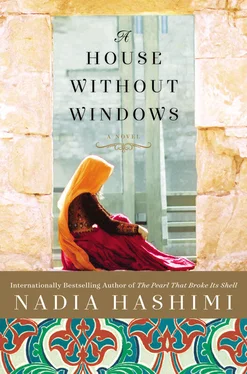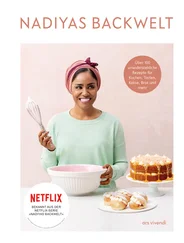“Madar. . Madar. .” Zeba sobbed. She buried her face in her mother’s shoulder. When she came up for air, she pulled her mother’s hands to her face and kissed her palms, closed her eyes, and held them against her cheeks. Gulnaz brushed her daughter’s tears away with the pads of her thumbs.
“I’m not crazy, Madar- jan, ” she whispered. “He says I’m crazy but I’m not!”
“You will be if they keep you in here,” Gulnaz said in an icy tone.
Zeba sniffled and nodded. She fidgeted with her hair, suddenly aware that in these days without a proper place to wash, she likely looked quite insane.
“You’re right. I don’t know why he kept me. I didn’t say or do anything out of the ordinary. I. . I. .”
“Of course not. I know how these people work. It’s God’s work they claim to do but for a good price.” The words came out of her mouth like gunfire. “Someone must be paying him to keep you. Did the lawyers say anything about money when they brought you here?”
Zeba shook her head.
“Uff! I can’t believe that Yusuf let this happen. What is wrong with that boy?” Gulnaz pressed the heels of her palms to her forehead as if to push her teeming thoughts back into her head. When she looked up, she’d regained her composure, looking more like the mother from Zeba’s childhood. “I’m going to talk to the mullah myself.”
“Do you think he’ll listen to you?”
Gulnaz reached into her handbag and pulled out a piece of soft flatbread folded in half and stuffed with halwa .
“Eat this, janem, ” she whispered. “You’ve got to keep up your strength.”
Zeba’s head fell to the side, and she exhaled deeply. She took the pocket from her mother’s hands and brought it to her lips. The flour and sugar glistened with grease. Her mother had scooped parts from the bottom of the pot, a toasted deeper brown. Those had always been Zeba’s favorite pieces. It shouldn’t have surprised her that her mother remembered but it did.
She swallowed hard, her throat dry.
Gulnaz pulled a small bottle of orange soda from her bag as well and placed it on the ground next to Zeba.
“I didn’t know what else to bring. Should I open it for you?” she asked.
Zeba nodded quickly.
Gulnaz gave the cap a quick twist and the bottle fizzed, a soft, carbonated whistle rising from the lip. Zeba took a long sip, the bubbles sending a tingle to her nostrils as they passed through her mouth.
“Thank you, Madar,” she said breathlessly. Her stomach was more grateful than she could express. She’d refused the mullah’s offer, but it hadn’t been easy. “Basir was here two days ago. I thought I’d imagined him. Sometimes I still think I imagined him, actually.”
“He was?” Gulnaz felt her throat tighten at the thought of her grandson braving the journey to this distant place to see his mother. She wished she could have brought him here herself.
“What did he say?”
“He said they were well enough. I can only pray he wasn’t hiding anything from me. He. . he brought me food,” Zeba said, her voice cracking.
You are not your father, Zeba had told him, immediately regretting her words. Basir’s whole body had jerked in response as if the thought hadn’t crossed his mind until his mother had said it. It had been her fear, not his.
How could you be sure? he’d demanded . You could have been wrong! Who are you to judge?
She’d floundered, searching for the right words and wondering if they even existed.
Gulnaz clucked her tongue and sighed.
“God save him.”
“Have you heard anything about the children, Madar? Has anyone sent word from Tamina’s house?”
Gulnaz let her gaze fall to the ground.
“I’ve called my friend Fahima who lives not far from them, but she said she hasn’t seen or spoken to Tamina since the fateha, when she went to pay her respects. She says Tamina’s been holed up in mourning. I told her that we were. . that we were very worried about the children. I asked her if she could walk past their home and listen for anything. She promised she would and I haven’t heard from her. I think that means she hasn’t seen anything to worry about. I’m sure they’re all right.”
Zeba wasn’t certain of anything and resented her mother’s thin reassurances. The absence of screams was not evidence that all was well, but she lacked the energy to point that out. She’d finished the halwa and bread and decided against wiping the grease from her chapped lips.
“ Janem, let me speak with the mullah. I’ll see if I can reason with him to send you back. This is no place for a mother of four children. This is no place for anyone, actually.” Gulnaz put her hands and knees on the unforgiving earth. She pushed herself to stand, wincing.
Zeba wanted to pull her back and make her stay but she didn’t. She merely watched as her mother set off to pull Zeba from the quicksand she’d fallen into. Gulnaz marched defiantly toward the figure standing on the hill. She clutched her handbag close at her side and snuck sidelong glances at the other cells. Seeing her coming, the mullah swiveled his head in either direction. He put one foot behind the other and retreated, halfheartedly, toward the house. Was he trying to avoid a conversation with Gulnaz? Zeba strained her eyes to see, staying mostly hidden behind the edge of the cell. She arched her back, her muscles stiff from sitting most of the day. She never imagined longing for Chil Mahtab this badly.
She could hear her mother’s voice. She had started her appeal to the mullah before she’d even reached him. She waved one arm back in Zeba’s direction. They were too far for Zeba to make out the conversation, but she could see her mother’s gesticulations. The mullah’s eyes were cast on the ground. Gulnaz was pointing to the heavens, summoning God into her plea.
This much was to be expected. It was the following moment that made Zeba’s stomach lurch. The mullah looked up slowly. He was trying to speak, but Gulnaz would not allow it. She was not finished. He took a step toward her and put his hand on her arm. Gulnaz pulled back sharply then stood staring at him. Her hand rose to her mouth and her left foot slid behind her, then her right. The mullah moved in closer, his head tilted to the side. He put both hands on her arms as if to keep her from running. Gulnaz’s head drooped like an untended puppet.
Why was he touching her? Zeba dragged herself outside the cell. The shackle scraped at the paper-thin skin of her ankle and she winced. The mullah was motioning to the quarters he kept next to the shrine. Impossibly, the mullah reached up and touched Gulnaz’s cheek. Gulnaz pulled away, but her feet were rooted.
Zeba wanted to shout. She wanted to run across the dry yard, climb that shallow hill, and claw at the mullah. She wanted to pull him off her mother who looked so uncomfortable under his touch. She pulled at the chain, but it yielded no more slack.
“Ayee!” she roared in frustration. She cupped her hands around her mouth and shouted. “Madar! Madar!”
Gulnaz turned at the sound of her voice, her fingertips over her lips. She slowly raised a hand to Zeba as if to say all was well. But all was obviously not well. What was he doing? The mullah led Gulnaz to the two-room structure with floor cushions and curtained windows Zeba could recall from her first day at the shrine. Her mother was walking with slumped shoulders. The mullah put a hand on the small of her back to lead her, and Gulnaz twitched, pulling away again but only enough that the mullah’s fingers slipped to her elbow. She stopped walking again and stared at him. She was shaking her head. He was pointing at the door.
Читать дальше











